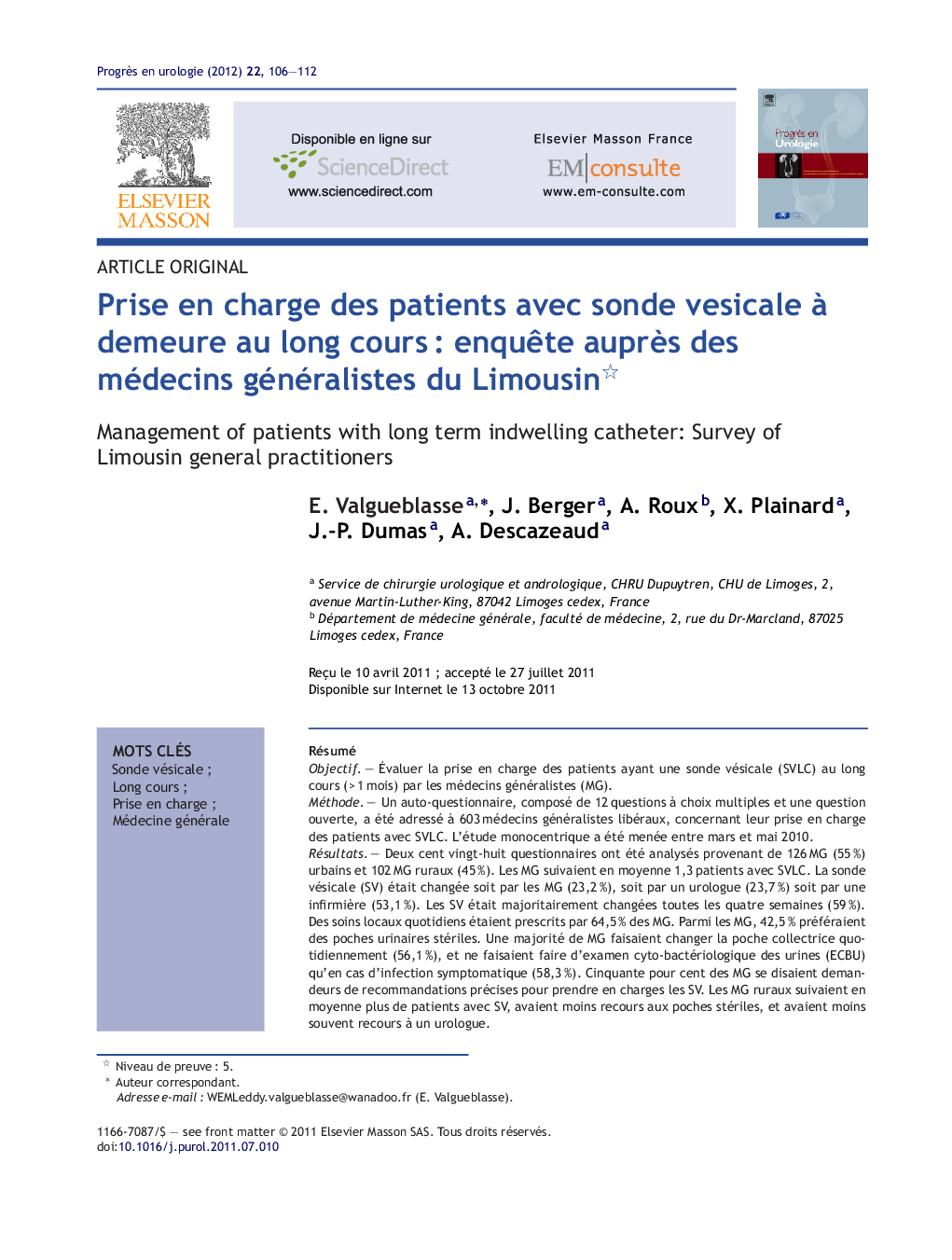| Article ID | Journal | Published Year | Pages | File Type |
|---|---|---|---|---|
| 3825222 | Progrès en Urologie | 2012 | 7 Pages |
RésuméObjectifÉvaluer la prise en charge des patients ayant une sonde vésicale (SVLC) au long cours (> 1 mois) par les médecins généralistes (MG).MéthodeUn auto-questionnaire, composé de 12 questions à choix multiples et une question ouverte, a été adressé à 603 médecins généralistes libéraux, concernant leur prise en charge des patients avec SVLC. L’étude monocentrique a été menée entre mars et mai 2010.RésultatsDeux cent vingt-huit questionnaires ont été analysés provenant de 126 MG (55 %) urbains et 102 MG ruraux (45 %). Les MG suivaient en moyenne 1,3 patients avec SVLC. La sonde vésicale (SV) était changée soit par les MG (23,2 %), soit par un urologue (23,7 %) soit par une infirmière (53,1 %). Les SV était majoritairement changées toutes les quatre semaines (59 %). Des soins locaux quotidiens étaient prescrits par 64,5 % des MG. Parmi les MG, 42,5 % préféraient des poches urinaires stériles. Une majorité de MG faisaient changer la poche collectrice quotidiennement (56,1 %), et ne faisaient faire d’examen cyto-bactériologique des urines (ECBU) qu’en cas d’infection symptomatique (58,3 %). Cinquante pour cent des MG se disaient demandeurs de recommandations précises pour prendre en charges les SV. Les MG ruraux suivaient en moyenne plus de patients avec SV, avaient moins recours aux poches stériles, et avaient moins souvent recours à un urologue.ConclusionLa gestion des patients ayant une SVLC était hétérogène et dépendait du mode d’exercice des MG. Certaines pratiques apparaissaient éloignées des recommandations disponibles. Ce travail pourrait constituer une base pour l’élaboration d’un document d’information destiné aux MG.
SummaryObjectiveTo evaluate the management of patients with long-term (> 1 month) indwelling catheter by general practitioners (GP).Patients and methodsA self-questionnaire was sent to 603 regional GP, between March and May 2010. It was composed of 12 multiple-choice questions and one open question, about management of their patients with indwelling catheter.ResultsTwo hundred and twenty-eight self-questionnaires were analyzed: 126 (55%) from urban GP and 102 (45%) from rural GP. On average, each GP managed 1.3 patients with long term indwelling catheter (> 1 month). The catheters were changed by the GP, urologists, and nurses in 23.2, 23.7, and 53.1%, respectively. In a majority of cases, catheters were changed every 4 weeks (59%). Nursing cares were prescribed by 64.5% of GP. Prescribed drainage bags were sterile in 42.5%. Most of GP reported to prescribe a daily change of drainage bag (56.1%). Urine analysis as performed only in case of symptomatic urine infection by 58% of respondents. Fifty percent of GP required guidelines for the management of patients with long term indwelling catheter. Rural GP managed significantly more patients with indwelling catheter, prescribed fewer sterile drainage bags, made change the drainage bag less often, and required the help of urologist less frequently.ConclusionManagement of long term indwelling catheter was heterogeneous among GP, and varied according to rural or urban practice. Some used significantly differed from available practice guidelines. This survey could be a basis for the preparation of an informative document aimed at GP.
